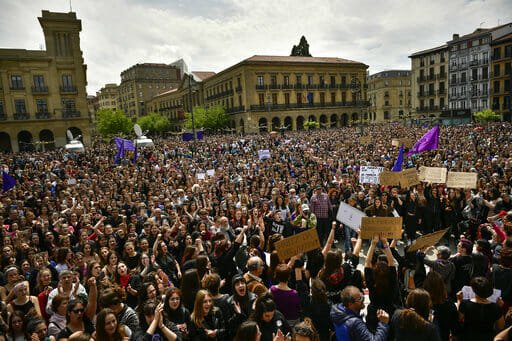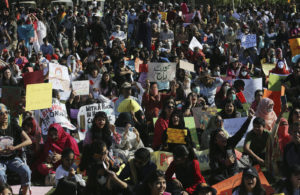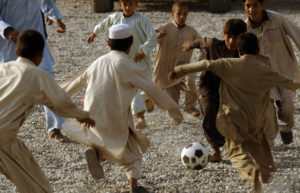Thousands Protest Ruling in Spanish ‘Wolf Pack’ Sexual Assault Trial
The case, which has dominated local media for two years, has sparked a #MeToo moment in Spain. Thousands of protesters mob Plaza del Castillo square in Pamplona, northern Spain, after the ruling in the "Wolf Pack" trial. (Alvaro Barrientos / AP)
Thousands of protesters mob Plaza del Castillo square in Pamplona, northern Spain, after the ruling in the "Wolf Pack" trial. (Alvaro Barrientos / AP)
In July 2016, an 18-year-old woman was allegedly gang-raped in Spain during the Running of the Bulls festival. The woman told police that five men in their mid-20s took turns raping her after offering to walk her to her car. The subsequent trial of these five men has become known as the “Wolf Pack” trial, referring to the name of a WhatsApp chat group the alleged perpetrators were in together. On Thursday, a judge found the men guilty of sexual abuse but not of rape. Thousands in Spain have since taken to the street, protesting the charges as too lenient.
The 18-year-old victim’s ordeal caused a national outcry.
Under Spanish law, the charge of sexual abuse differs from rape in that it does not involve violence or intimidation.
Women and men came out into the streets in Madrid, Barcelona, Valencia and Pamplona itself, and in more than a dozen other cities across Spain.
In Madrid, police tried to block demonstrators who marched on the Congress of Deputies, shouting slogans such as “patriarchal justice” and “sister, here is your pack”.
The protests began outside the courthouse in Pamplona, where supporters of the victim had gathered to hear the verdict, and women’s rights groups organised protests elsewhere.
After the assault, the defendants reportedly exchanged messages about raping the victim, and said they had video footage of the attack. Controversially, the judge in the trial did not allow the jury to consider these messages, although the video footage itself was viewed during the trial and reportedly showed each of the five men raping the woman. The defendants were sentenced to nine years in prison on the charge of sexual abuse and were required to pay $61,000, in total, to the victim. State prosecutors said they will appeal the ruling.
Shortly after the ruling, the Spanish national police force tweeted out “No is no” a dozen times (in Spanish):
#NoesNo#NoesNo #NoesNo#NoesNo#NoesNo#NoesNo#NoesNo#NoesNo#NoesNo#NoesNo#NoesNo#NoesNo ESTAMOS CONTIGO ?091
— Policía Nacional (@policia) April 26, 2018
The Washington Post reports:
Meanwhile, politicians have promised to rethink Spain’s laws on sexual violence. Right now, a victim must prove that a perpetrator was violent or intimidating to gain a rape conviction. Many women’s rights activists say that sets the bar too high.
An editorial in the newspaper El Pais noted that violence or intimidation can be hard for survivors to prove. It “leads to the painful question of just how much a person needs to fight to avoid being raped without risking getting killed, and still get recognized as a victim of a serious attack against sexual freedom while ensuring that the perpetrators do not enjoy impunity,” the newspaper said, according to a translation by Agence France-Presse.
“The government has been, is and always will be with the victims,” Íñigo Méndez de Vigo, a spokesman for the government told reporters.
Amnesty International argued on Twitter that the Wolf Pack case “could be sending a worrying message: If women don’t resist, there is no rape.”
La violación sólo debe estar definida por la ausencia de consentimiento de la víctima, y no por la existencia de fuerza física, amenaza, coacción o resistencia de la víctima.
— Amnistía Internacional España (prensa) (@AIPrensaESP) April 26, 2018
Protester Iria Grandal told CNN: “In Spain, there is still a lot of machismo and misogyny, in jobs, salaries, and including young people. But I think things are changing now. You could see it in the massive demonstration on March 8—for International Women’s Day—and you could see it now. Women will no longer remain silent, and the youngest among us are also taking to the streets to protest.”
Your support matters…Independent journalism is under threat and overshadowed by heavily funded mainstream media.
You can help level the playing field. Become a member.
Your tax-deductible contribution keeps us digging beneath the headlines to give you thought-provoking, investigative reporting and analysis that unearths what's really happening- without compromise.
Give today to support our courageous, independent journalists.






You need to be a supporter to comment.
There are currently no responses to this article.
Be the first to respond.